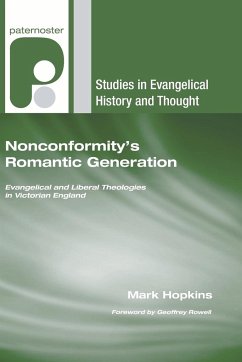This is the first book to attempt a theological portrait of a pivotal generation in the history of the English Free Churches. It does so through a dual strategy: firstly, studying the theological development of key leaders over several decades; and secondly, capturing the state of the Unions -- Congregational and Baptist -- through the freeze frames provided by their biggest denominational controversies in the 1870s and 1880s respectively. Archetypal Victorians whose working lives stretched through most of that long reign, in the 1860s this generation inherited leadership from a predecessor that had eked out the dying momentum of the Evangelical Revival. Bathed in the formidable energy of a newly discovered Romanticism, they wrestled strenuously with the fresh challenges it exposed them to while engaged in lengthy ministries in thriving city churches. They variously tried rejecting and embracing the liberal transformation of their evangelical heritage, or even, in the case of R.W. Dale, somehow achieving their synthesis. Yet in the end neither he nor C.H. Spurgeon, nor anyone else, really found an expression of Christian faith that the next generation could take up and build with, and their successors were to preside over the first obvious stages of a long, deep, and traumatic decline. At a time when this period is again being scrutinized for that elusive 'answer', the author will not claim to have tracked it down there; but the conclusion nonetheless indicates that this study surprisingly helped open up vistas much broader than those of the nineteenth-century debates. The changes in Evangelical Nonconformist theology during the Victorian period, in a conservative as well as in a liberal direction, are thoroughly analyzed here by Mark Hopkins. The 'Downgrade Controversy,' in which C. H. Spurgeon challenged the liberal tendency, is illuminated as never before. - David Bebbington, Department of History, University of Stirling, Scotland, UK Mark Hopkins is a careful and sympathetic scholar who gets behind the headline thinking that so easily translated theological differences into divisive controversies. Thus his monograph will be essential reading for all who wish to understand the polarities of late nineteenth-century Nonconformity. - John Briggs, Senior Research Fellow in Ecclesiastical History and Director of the Centre for Baptist History and Heritage, Regent's Park College, University of Oxford Dr Mark Hopkins' book touches on events which in certain circles continue to have a life and a legacy of considerable weight. His careful and painstaking research particularly into the 'Downgrade Controversy' offers new insights and fresh perspectives in a way which illuminates the present as well as the past. - Nigel G. Wright, Principal, Spurgeon's College and Ex-President, Baptist Union of Great Britain Mark Hopkins was born in Surrey and read modern history at Christ Church, Oxford. After three years working with Christian students in Belgium he returned to Christ Church to work on a doctoral thesis published here in revised form. Since 1990 he has been a lecturer at the Theological College of Northern Nigeria in Bukuru.
Bitte wählen Sie Ihr Anliegen aus.
Rechnungen
Retourenschein anfordern
Bestellstatus
Storno

